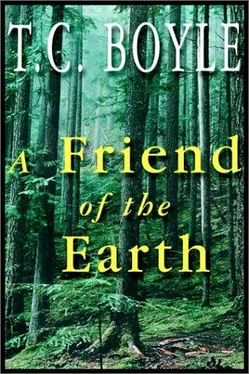"You don't know that, Ty-" There's an edge to Andrea's voice, and whose side do you think she's on here?
"Want to bet? You might think you know him, after, what-four, five months? — but I've been with him ten years, and I know he's getting squirrelly, has to be. If it wasn't for the weather and the mucosa business, he'd have been out of here months ago, believe me."
And then the door swings open, right on cue, and there he is, Mac, in hat, shades and eel whips, flanked by the two Als. "What's happening, people?" He sings, spreading his arms wide. "Don't you just love this groovy sunshine? Isn't this just a day? Do we deserve it or what?"
The Als have seen better days. Their eyes are haunted by visions of blackjack tables, cocktail waitresses, the track, and their skin is the color of the growth medium in a petri dish. The taller one was a professional wrestler back in the time when people cared about such things, and the shorter one, as I say, has put on so much weight he doesn't even look human. They take their places heavily, and without joy.
Mac is grinning. Mac is overflowing with all the emotions his bodyguards lack, and for a minute there I think he's going to snatch the bust of Chuck D off its pedestal and waltz round the room with it, but he slips into his chair at the head of the table and unfurls his napkin with a practiced snap of the wrist. "Eggs today, that's what I hear," he crows, treating us to his famous smile, "just like Mama used to whip up when there was eight of us growing up in Detroit, yes, absolutely, eggs for breakfast, lunch and dinner — and now they're a treat, how do you like that?"
Before anybody can respond, April Wind draws in an audible breath — a stabbing, shrieking, stifled-in — the-cradle sort of breath — and asks, "Is it true, Mac?"
Mac turns his head to me, the shades flinging off the light of the chandelier in a poisonous silver flash, then comes back to April Wind, and I can't help thinking of the tight little smile of satisfaction on her face the first morning I saw her slipping out of Mac's room or the time he held her in his lap like a ventriloquist's dummy all through a showing of Soylent Green in the screening room. Good, I think, let her get her comeuppance. Who is she anyway, and how did she weasel her way in here?
Mac's response is so soft, so sweet and lispingly breathy, my old man's ears can barely pick it up. "If you mean what I think you mean, baby, then, yes, it's true, we're out of here-Al and Al and me-this afternoon. Business, that is. Up north. You all can stay on, and everything's going to be built back again, so don't you worry, Ty-you know I wouldn't sacrifice those precious sweet creatures down there for anything in the world."
April Wind wants to say a whole lot more, I can see that, she wants to call on the spirits of the trees and the other animist gods, wants to talk crystals and auras, wants to marshal all the forces of woo-woo to bind Mac to her, to us, but she just gives him a plaintive look and stockpiles her words for later, when she can get him alone. I'm not a betting man, but I give her less than a ten-percent chance of finding a seat on that helicopter when it rises up out of the muck with our resident god aboard. Goodbye, Mac, I'm thinking, and let's get on with it.
Events to this point are still pretty clear in my mind, the champagne, the promise of eggs fried in butter, Mac, April Wind, Andrea, the two Als-all that's been preserved in the hard-drive of my old man's memory. But the rest of it, I'm afraid, suffers from gaps and deletions. It's the shock factor, I suppose, selective memory, repressed material, events so naked and grisly you can't admit them. For better or worse, here's what I can bring up: Fatima, all in black, shoving through the swinging doors to the upper kitchen, which is really just a warming room, connected by dumbwaiter to the main kitchen on the first floor and the incinerator in the basement, and Zulfikar right behind her in his white toque and spattered apron. Both of them carrying big silver chafing dishes and a familiar ambrosial aroma that takes me back to my mother, my grandmother, the kitchens of old, but I can't taste those eggs now, so I don't think we got that far. I see the big silver dishes in the center of the table, Fatima's pitted black eyes peering out of the gap in her yashmak, and then I'm seeing Dandelion, incongruous as that may seem, scraping his way up the dumbwaiter from the basement with a kind of grit and leonine initiative I'd have had to admire under other circumstances. And that's a picture, four hundred — and — some-odd pounds of determined cat, the yellow fire of his eyes, the mane swinging from the back of his head like an ill-fitting wig, the spidering limbs and grasping claws. He defies gravity. He is silent, absolutely, no sound but for the rasp of those hooked claws digging for purchase. Dandelion. Climbing.
The door swings open again, right on Fatima's heels, as if there's another server back there, more to the feast than just eggs-curries and lamb tikka, defrosted halibut in a cardamom sauce, unexpected delicacies and further delights — but no human agency has pushed open that door. I don't know who becomes aware of it first. I remember looking up, heads turning, the motion of the door, and then seeing Dandelion there. And smelling him. A lion in the doorway might have been a trick of the light, slip off your glasses and polish them on your sleeve, get a new prescription ASAP, but there was no arguing with that smell. That smell was immemorial. That smell was the smell of death.
In the wild, when there was a wild, lions would kill their prey through suffocation. They would bring down a zebra or a wildebeest or even a cape buffalo, and then clamp their jaws on the throat or, more typically, over the mouth and nose, until the animal lay still. And when they took humans, they would most often attack at night, biting through the walls of a tent or but and seizing the victim by the skull, crushing it instantly. If the victim awoke or the lion missed its stroke, things would get nasty. Then the claws would come into play, and the victim would be dragged off screaming into the night. Of course, in a chance encounter in the bush, all bets Were off. The lion would do what lions do.
Is there a snarl? Or a woof? I don't know, but I have a hand on Andrea's arm and I'm dragging her awkwardly down into the vacancy beneath the table, chairs scraping, somebody shouting, God Himself invoked by one of the Als, the one who's about to be sliced open like a watermelon and flung across the room even as Dandelion, spitting and roaring, homes in on Mac. Why Mac? I'm thinking, as I scramble for the door with Andrea in tow and April shrieks and the surviving Al tries to draw a ridiculous little pistol from the leather holster under his arm, but thinking isn't something you do a lot of under circumstances like these. The roaring alone is enough to seize your heart — and I've never seen Dandelion like this, so wrought up and nasty, whirling, biting, slashing — and then there's the sight of the blood. And worse, the sight of Mac-our benefactor, Dandelion's benefactor, the provider of meat, money, health care, companionship, a true and caring friend of the animals-lying there so still in the cradle of his overturned chair. His hat is gone, the shades are crushed, the eel whips drawing the blood out of his scalp like the bright-red tips of a painter's brushes. Andrea is screaming something in my ear and the door to the hallway is closing on the scene, closing firmly, Ratchiss' big gun all the way down on the first floor and no hope for anybody or anything left in all this world.
Part Three. Wildlife in America
Lompoc/Los Angeles, September — October 1991
Читать дальше












